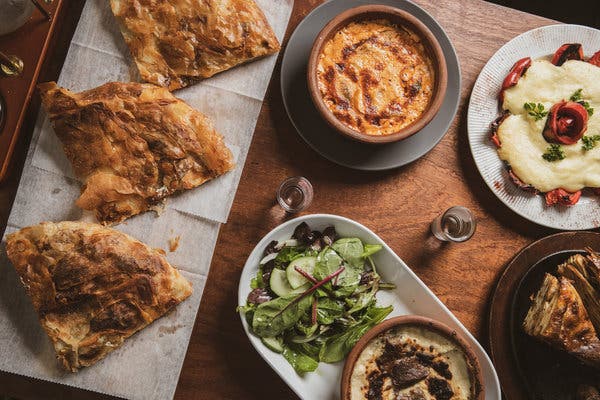The simpler the dish, the more it demands of the cook. Every gesture counts, even the smallest, like the way Aida Demce, the chef of Dua Kafe in the East Village, places an earthen casserole into the oven while still empty, so it will be hot when the ingredients go in.
Then, she sautés bell peppers with tomatoes, onions, a handful of mountain herbs and Albanian gjize, a cheese made from curdled yogurt, as fluffy as ricotta but tangier, almost outright sour. The peppers are cooked until “soft but not too soft,” said Ms. Demce’s husband, Bobian, who runs the front of the house, then heaped into the waiting casserole for a turn in the oven.
This is fergese, and it arrives at the table still volcanic, accompanied by thick cuts of bread in a metal pail. It is just one in a parade of dishes at this homey Albanian restaurant that celebrate creaminess, which is to say an enveloping, voluptuous richness that is as much an embrace of life as it is of food.
More bell peppers appear in speca me maze, blistered and charred — red and black, the colors of the Albanian flag, Mr. Demce points out — and draped in a meld of cornmeal, heavy cream and cheese, velvety like polenta but looser. The people at my table dutifully ate it with the peppers, then slyly scooped it up with bread, and finally stole spoonfuls to eat on their own.

The beef for qebapa, rugged skinless sausages, comes from an Albanian butcher in Brooklyn; Mr. Demce would trust none other. Ms. Demce adds contours of garlic, sea salt and paprika that’s sweet, not hot. (“I love spicy,” Mr. Demce said, “but most Albanians don’t,” and they are the critics he heeds.) Fatter than cigars, the sausages are arrayed on a flat cast-iron pan and given broad lashes of a creamy cheese sauce — really, an unnecessary gilding.
Byrek, savory phyllo pies, flake almost at a glance, a swift succession of shatter, crumble, dissolve. To make them, Ms. Demce stretches dough until she can see the light through it, then folds and folds, glossing the layers with just enough vegetable oil that they don’t cling.
Inside might be feta and gjize — alone or ensnared in a jade mesh of spinach — or beef shining with onions. In Albania, there would be leeks, too, but Mr. Demce despairs of the short-necked specimens he’s found here. “You don’t get punch,” he said.
For tave Elbasani, lamb is first braised into dishevelment, then laid in hunks, juices running, in a preheated casserole. Ms. Demce makes yogurt — every house in Albania has its own, Mr. Demce said — simmers it with eggs and roux and pours it over the meat.
Once baked, the dish is close in texture to a quiche, but denser, heavier, soporific. It’s almost too much at the end of the meal, after the preceding creaminess; you’ll want to plan ahead and order more sparingly.
Sallate mikse turshi, mixed pickles, are essential, to bring a reviving brightness: pearl onions, bell peppers, cornichons, tomatoes — all imported from Albania — and cabbage from an Albanian deli in the Bronx. That borough is home to the city’s largest population of Albanian immigrants, who have traditionally run Italian restaurants, serving the food of their neighbors across the Adriatic Sea.
When the Demces opened Dua Kafe last fall in a former tailor’s shop, they wanted to showcase their native cuisine. They both grew up in Lushnje, just south of Tirana, Albania’s capital, but Mr. Demce’s roots are in the north, like those of the 15th-century hero Skanderbeg, an Albanian nobleman’s son who was raised as a hostage in the Ottoman court and drafted into the imperial army, until he was finally able to turn on his captors.
Mr. Demce’s grandmother cooked in the northern style. One of her desserts is memorialized here, simple and perfect: baked plums with ice cream, which soon starts to melt and swim. She used to make it with whatever fruit was in season, a quick, unfussy business on the stove.
A portrait of Skanderbeg hangs at the back. Photographs of other famous Albanians — many of whom have dined at the restaurant and bestowed autographs — crowd another wall.
Mr. Demce said wistfully, “We’re just waiting for Dua Lipa” — the London-born pop star and daughter of Albanian immigrants, who shares a name with the restaurant. It means love.
Follow NYT Food on Twitter and NYT Cooking on Instagram, Facebook, YouTube and Pinterest. Get regular updates from NYT Cooking, with recipe suggestions, cooking tips and shopping advice.




